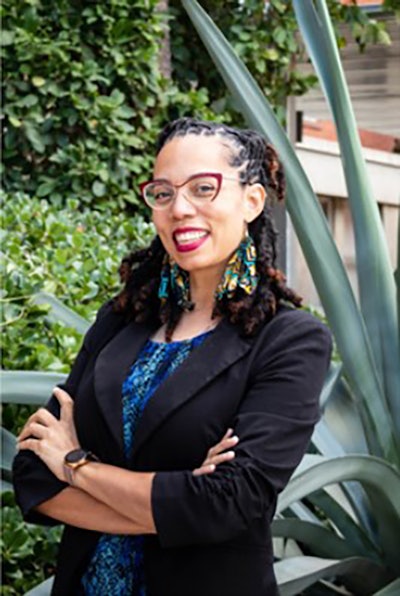 Dr. Dawn M. Demps
Dr. Dawn M. DempsWhat do we really mean when we say something is a red line? It implies a point past which the action or situation will not be tolerated. It suggests that we will take a stand against or refuse to participate in the new environment on the other side of the line. It signals that which is unbearable and cannot be upheld. Yet, each individual’s red line is at a different place, influenced by one’s access to resources, vulnerabilities, values, and philosophies regarding what can be acceptably sacrificed for the perception of security.
In this second era of Trumpism, or as Nicole Hannah-Jones would call this nadir moment, the understanding of what is tolerable changes daily, pushing even the most well-intentioned folks closer to accepting what was once unimaginable. We become unrecognizable to ourselves in our efforts to go along to get along. An example of this was on display in the public debate with the award-winning author and journalist Ta-Nehisi Coates and New York Times writer Ezra Klein.Coates called Klein out for going a bridge too far to appeal to current political forces.
Currently, I serve as a junior scholar at one of the nine universities invited to sign the administration’s compact to cement conservative priorities into university policies in exchange for “multiple positive benefits” connected to funding. This act of coercion is exactly why predetermining one’s red lines is an exercise all academics should engage in. Is my red line when the institution requests I change the title or topics of my courses? What about when I can no longer secure funding for my research? Is it when they coontrol the books and materials I use in my teaching, or when they are allowed to drag students off my campus or out of my classroom? I have borne witness to the specter of what this administration has meant for academic freedom and research advancements, which is stifling. This is beyond the material consequences to people’s livelihoods.
While there has been some resistance to the hard-armed demands and required reverence to the trifles and narcissistic tangents of this administration, there has overwhelmingly been acquiescence and cowering. While some of the administration’s proposals have not passed jurisprudence muster and been reversed or held up in the courts; the threats alone has had the desired effect across universities and colleges. It has caused many to flee, freeze or fawn, but rarely fight. Academia scampers with no real plan or defense beyond masking language, attempting good-faith negotiation with bad-faith actors and praying our chameleonesque skills render us unnoticed. Even the hallowed promise of sanctuary through tenure has tethered tongues more than it has ensured intellectual bravery as states move to dismantle scholarly independence.
Meanwhile, beyond the ivory tower, too many of our citizenry play unbothered, especially those with privilege in any facet of society. They dismiss concerns with retorts that “snowflakes” are making a big deal of nothing and “over-dramatizing”. These rhetorical maneuvers are tools of gaslighting and deception. They effectively make us question reality and what we are seeing with our own eyes, even as the work of dismantling supports, uprooting rights, silencing dissent and cementing authoritarianism is happening in real time. The undermining of academia we are witnessing is an essential step in the larger counter-democracy effort.
These strategies are easily implemented in this country at this time for three main reasons:
1) Weakened education: Too many are ignorant, or apathetic, about the lessons of history and workings of government. Divestment in education has made this ignorance almost inevitable. As a result, segments of the public are easily manipulated by cherry-picked research and click bait headlines. Some even revel in this ignorance, uplifting it as a badge of honor that places them above those who concern themselves with the past or empathize with matters beyond their immediate benefit.
2) Capitalism’s Stranglehold: When everything you and your family need to survive is tethered to systems controlled by the monied few, and you are separated from communal bonds, you are effectually enslaved to the whims of those who control the levers. For sanity’s sake, one may ignore or accept shallow excuses to ease the dissonance that arises from the uncomfortable bits.
3) Desire for reversion: Yes, there are many that do want to return to old power arrangements in which the progress of the last 50-plus years is reversed or, more pointedly, erased. This one is particularly disquieting, because many believed the nation had truly progressed. After all, had even elected a Black guy twice to the highest office in the land! Yet, it is hard to proclaim that “this is not who we are” when in fact, this is exactly who we are.
We have a responsibility to stand against injustice, even as it comes at a cost. It is a moral position regardless of personal benefit. Yet, for those who are singularly motivated by self-interest, I offer this: the train always leaves for the next station. The next stop could be yours.
Should we plan to mitigate the inevitable blows that will come for standing?
Absolutely. Must we consider and cover those most sensitive in our stead?
Undoubtedly. However, we can no longer continue to forgo principles for comfort, as comfort has proven to be tenuous at best and captive at worst
The philosopher George Yancy invites us to consider how “what we do and what we fail to do makes us complicit in perpetuating these sorrows.” Reflect on that as you examine your red line. I hope it moves you to gather your bravery, resources, wits, and creativity to organize and prepare to act in defiance, not defeat.
Dr. Dawn M. Demps is an assistant professor in the Department of Educational Policy Studies & Practice at the University of Arizona.















